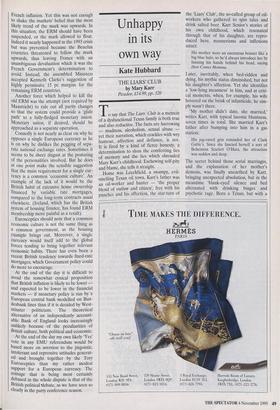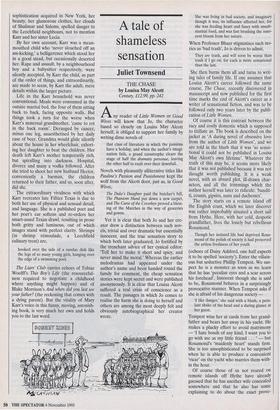Unhappy in its own way
Kate Hubbard
THE LIARS' CLUB by Mary Karr Picador, £14.99, pp. 320 To say that The Liars' Club is a memoir of a dysfunctional Texan family is both true and also reductive. The facts are harrowing — madness, alcoholism, sexual abuse yet their narration, which crackles with wry humour, affection and defiance, is not. It is fired by a kind of fierce honesty, a determination to shun the comforting lies of memory and the lies which shrouded Mary Karr's childhood. Eschewing self-pity and blame, she tells it straight.
Home was Leechfield, a swampy, evil- smelling Texan oil town. Karr's father was an oil-worker and hunter — 'the proper blend of outlaw and citizen', free with his punches and his affection, the star-turn of the 'Liars' Club', the so-called group of oil- workers who gathered to spin tales and drink salted beer. Karr Senior's stories of his own childhood, which resonated through that of his daughter, are repro- duced here, mannerisms and inflexions intact:
His mother wore an enormous bonnet like a big blue halo, so he'd always introduce her by fanning his hands behind his head, saying Here Comes Momma.
Later, inevitably, when bed-ridden and dying, his mythic status diminished, but not his daughter's affection. Yet she identifies a 'low-lying meanness' in him, and at criti- cal moments, when, for example, his wife hovered on the brink of infanticide, he sim- ply wasn't there.
`My mother didn't date, she married,' writes Karr, with typical laconic bluntness, seven times in total. She married Karr's father after bumping into him in a gas station:
His jug-eared grin reminded her of Clark Gable's. Since she fancied herself a sort of Bohemian Scarlett O'Hara, the attraction was sudden and deep.
The secret behind those serial marriages, and the explanation of her mother's demons, was finally unearthed by Karr, bringing unexpected absolution, but in the meantime 'blank-eyed' silence and bed alternated with drinking binges and psychotic rage. Born a Texan, but with a sophistication acquired in New York, her beauty, her glamorous clothes, her clouds of Shalimar and Salems, spelled danger to the Leechfield neighbours, not to mention Karr and her sister Lecia.
By her own account, Karr was a mean- mouthed child who 'never slouched off an ass-kicking,' a belligerence which stood her in a good stead, but occasionally deserted her. Rape and assault, by a neighbourhood boy and a babysitter respectively, were silently accepted, by Karr the child, as part of the order of things, and extraordinarily, are made to seem, by Karr the adult, mere details within the larger picture.
Life in the Karr household was never conventional. Meals were consumed in the outsize marital bed, the four of them sitting back to back, facing opposite walls. But things took a turn for the worse when Karr's maternal grandmother, 'came to rot in the back room'. Deranged by cancer, minus one leg, anaesthetised by her daily case of beer, Grandma would glide silently about the house in her wheelchair, exhort- ing her daughter to beat the children. Her death left Karr's mother temporarily rich, but spiralling into darkness. Hospital, divorce and many a vodka followed. After she tried to shoot her new husband Hector, conveniently a barman, the children returned to their father, and so, soon after, did she.
The extraordinary vividness with which Karr recreates late Fifties Texas is due to both her use of physical and sensual detail, and language. She is a published poet and her poet's ear softens and re-orders her smart-assed Texan drawl, resulting in prose both gritty and luminous, out of which images stand with perfect clarity. Shrimps (in shrimp remoulade, a Leechfield culinary treat) are,
hooked over the side of a sundae dish like the legs of so many young girls, hanging over the edge of a swimming pool.
The Liars' Club carries echoes of Tobias Woolff s This Boy's Life (the resourceful- ness required to negotiate a childhood where anything might happen) and of Blake Morrison's And when did you last see your father? (the reckoning that comes with a dying parent). But the vitality of Mary Karr's voice in this funny, moving, astonish- ing book, s very much her own and holds you to the last word.











































































 Previous page
Previous page